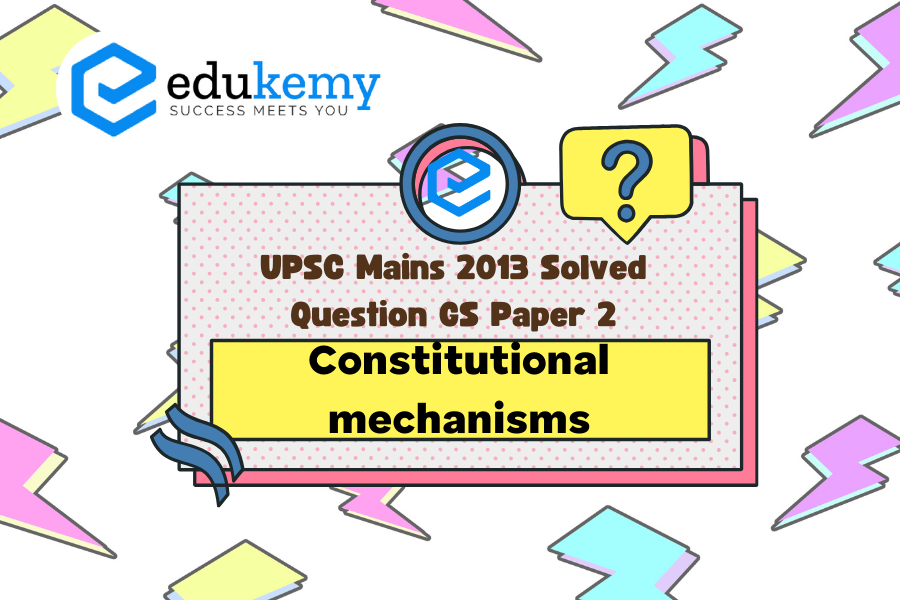Constitutional mechanisms designed to resolve inter-state water disputes in India have encountered persistent challenges, revealing shortcomings in both structural design and procedural implementation. The failure to effectively address and resolve these disputes can be attributed to a combination of structural inadequacies and procedural deficiencies. Structurally, the distribution of water resources among states lacks clarity and precision, leading to ambiguity and conflicting interpretations, thereby exacerbating disputes. Moreover, the existing legal framework often fails to provide timely and enforceable resolutions due to complexities in jurisdiction and overlapping authorities. Procedurally, the mechanisms for dispute resolution suffer from delays, bureaucratic hurdles, and politicization, impeding efficient adjudication and exacerbating tensions between states. Additionally, the absence of mechanisms for proactive conflict prevention and management exacerbates the situation, allowing disputes to escalate before interventions occur. Therefore, the failure to address inter-state water disputes stems from both structural flaws in the legal framework and procedural inefficiencies in its implementation, highlighting the need for comprehensive reforms to enhance effectiveness and foster cooperation among states.
Tag: Governance.
Contents
Decoding the Question:
- In Introduction, try to briefly write the Constitutional mechanism related to inter-state water dispute.
- In Body, mention various reasons for the failure of Constitutional mechanisms to resolve inter-state water disputes.
- In Conclusion, suggest a way forward.
Answer:
In pursuance of Article 262, Inter-state water dispute Act was passed empowering the Central government to set up an ad hoc tribunal for the adjudication. It also excluded jurisdiction of the Supreme Court or any other court from the dispute resolution matter. However, disputes like Cauvery water, Mahadayi river etc. point out various issues with the existing mechanism.
Structural issues:
- There is no structure to promote a multi-stakeholder approach in negotiation. Often farmers and villagers whose livelihoods depend on the river in dispute are excluded.
- There is no institutional arrangement within the state and beyond at the inter-state river basin which can facilitate the exchange of hydrological information.
- A platform to resolve disputes at an early stage through negotiations, conciliation or mediation is missing.
- A structure in the form of appellate tribunal to appeal against the verdict is absent. The verdict of the tribunal is final and binding on parties.
Procedural issues:
- Despite having no jurisdiction, SC frequently accepts the case through a special leave petition (SLP). It further complicates the matter, as SC does not have the technical capacity to assess the case. E.g. – In 2016, SC asked the Karnataka government to release 6000 cusecs of water without any scientific backing.
- No process to ensure timely establishment of tribunals by Centre and also there is no fixed timeline for tribunals to deliver verdict. Request for the Cauvery water dispute tribunal had been pending since 1970 and the tribunal constituted in 1990. This loophole was fixed through the IWD amendment act of 2000 which made it mandatory to constitute a tribunal within 1 year and final judgment by tribunal within 3 years. However, this timeline is not followed.
- There is no process to fix the accountability of the Central government with this regard. Centre often delays the publication of the verdict given by the tribunal in official gazettes.
- Also, there is no process to fix the accountability of states involved. States wilfully disobey the verdict.
The government has recently introduced the Inter-State River Water Disputes (Amendment) Bill, 2019 in Lok Sabha, which tries to address issues of limited time frame, data bank, functionality of tribunals, etc., by creating Disputes Resolution Committee.
In case you still have your doubts, contact us on 9811333901.
For UPSC Prelims Resources, Click here
For Daily Updates and Study Material:
Join our Telegram Channel – Edukemy for IAS
- 1. Learn through Videos – here
- 2. Be Exam Ready by Practicing Daily MCQs – here
- 3. Daily Newsletter – Get all your Current Affairs Covered – here
- 4. Mains Answer Writing Practice – here


